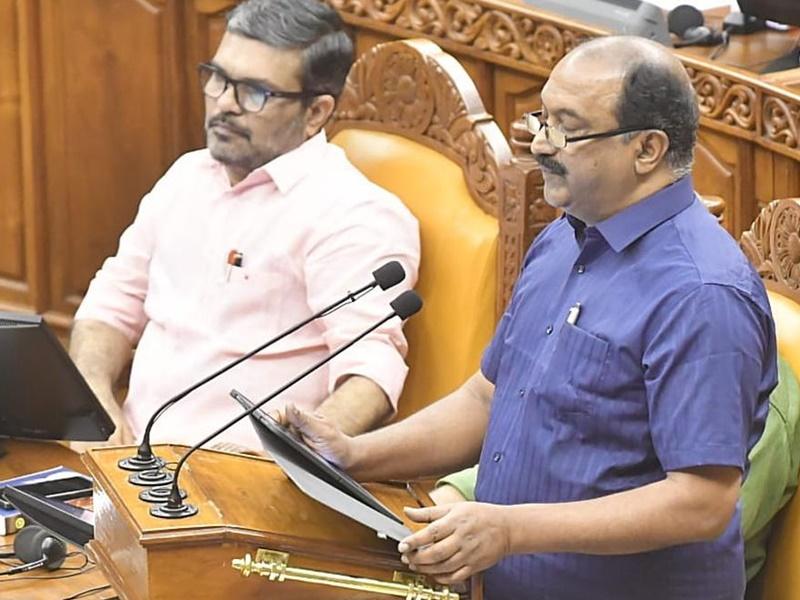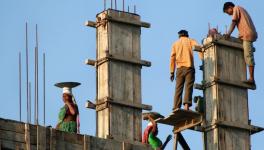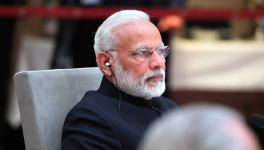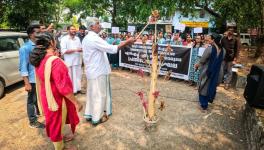Kerala Budget Focuses on Public Spending Despite Restrictive Fiscal Directives

Image credit: Lokmat
The Budget presented by the finance minister of Kerala, K N Balagopal, reiterated Left Democratic Front (LDF) government’s thrust on public investment and ensuring welfare measures for people. The government has been lauded for sticking to its political commitments despite unfavourable fiscal conditions, fuelled by the centralisation of taxation powers.
The fiscal deficit is estimated at Rs 39,662 crore which is 3.5% of the Gross State Domestic Product (GSDP), while the revenue deficit is estimated at Rs 23,942 crore (2.1% of GSDP).
The finance minister, during his speech, accused the Union government of having a partisan approach as the latter has been refusing to consider the demands regarding extended GST compensation and revenue deficit.
In an effort to increase its tax revenue, the government has introduced a cess on petrol, diesel, and liquor, which will go towards the Social Security Seed Fund.
The Opposition, United Democratic Front (UDF), has criticised the government for imposing cess and increasing other charges on services provided by the government.
‘HARD BUDGET CONSTRAINTS’
The finance minister began his Budget presentation by listing challenges faced by the state in the last few years, including the massive floods, Okhi cyclone, the hasty implementation of GST, demonetisation, and the COVID-19 pandemic. The economy has recovered despite the slowdown elsewhere, with a 12.1% growth rate.
With reduced taxation powers and limitations for borrowing, the government claimed to face hard budget constraints.
“Kerala is not in a debt trap; there is no change in our approach towards loans. We are not of the opinion that loans should only be given to the bad debt corporates from the hard-earned money of common folks, invested in various financial institutions,” the minister said during his presentation.
“Given the context of restricted borrowing limits and reduced power of taxation with state governments, this budget has addressed important issues,” opined Dr R Ramakumar, economist and professor at Tata Institute of Social Sciences (TISS).
EMPHASIS ON PUBLIC SPENDING
More emphasis was given to the continuation of the alternate policies pursued by the LDF government, with higher allocations for the knowledge economy, infrastructure development, technology parks, cooperative sector, Kerala Startup Mission (KSUM), and public health sector among other vital departments.
The budget has also earmarked Rs 2,000 crores for market intervention to control the prices of essential goods. The Local Self Government (LSG) department will get Rs 14,149 crores; social security pension has been allocated Rs 9,764 crores, Rs 1436 crores for constructing 71,861 houses through the LIFE mission, and Rs 1,000 crores are allocated for the Make in Kerala scheme.
The general education department will get Rs 1,773.09 crores, while the higher and technical education has been allocated Rs 816.79 crore. The medical and public health sector has been supplied with ₹2828.33 crores.
Besides allocating Rs 75 crores each for Idukki, Kasargod and Wayanad packages, funds were set aside for urban and rural employment schemes, alleviation of extreme poverty, plantation workers' welfare, and care for elderly among others.
THRUST ON NEW AND TRADITIONAL AREAS
The government continues to focus on the information technology sector, with fund allocation for Infor parks, Techno parks, Cyber parks, State Data Centre, Digital University, State Information Technology Infrastructure Limited, K-FON and Kerala Space Park.
With the aim of achieving net carbon neutrality by 2050 and 100% dependence on renewable energy by 2040, the government has earmarked Rs 200 crores for Green Hydrogen hubs.
“Most importantly, the government is investing in the knowledge economy and new generation technologies including the research on graphene. Such aspects are highly welcome and would benefit the state,” said Ramakumar.
The allocation for agriculture and allied products is also being increased. Cashew and plantation sectors longing for aid have been granted aid in the Budget.
“Important areas of focus in agriculture including improving the fertility of soil to increase production, productive seeds, better dairy production, focus on breeding and feeding policies are provided adequate sanction in the budget,” added Ramakumar..
IMPOSITION OF CESS
Stressed by the reduced taxation powers and increasing centralisation of taxing policies, the government has decided to impose Rs 2 cess on petrol and diesel, along with a cess on Indian made foreign liquor.
Responding to the question about the possibility of burdening people by imposing cess, Ramakumar said, “The government has earmarked this cess towards the Social Security Seed Fund, thus putting money back into the pockets of the people.”
The finance minister also cited the declining fiscal federalism as a new challenge facing the state governments.
A one-time cess is also being imposed on two-wheelers, and light, medium and heavy motor vehicles. An increase in royalty on mines and minerals, increase in property tax, electricity duty for commercial industrial units and judicial court fee are expected to increase the state's revenue.
“The perspectives of the new governments across the world, which are profit-oriented and not people-centric, create a severe crisis,” Balagopal said in his concluding remarks.
“We have the responsibility to protect the peculiarities and characteristics of Kerala. The policy of the LDF Government is to hold everyone in Kerala together. This government is committed to bringing development and welfare to everyone,” he added.
Get the latest reports & analysis with people's perspective on Protests, movements & deep analytical videos, discussions of the current affairs in your Telegram app. Subscribe to NewsClick's Telegram channel & get Real-Time updates on stories, as they get published on our website.
























